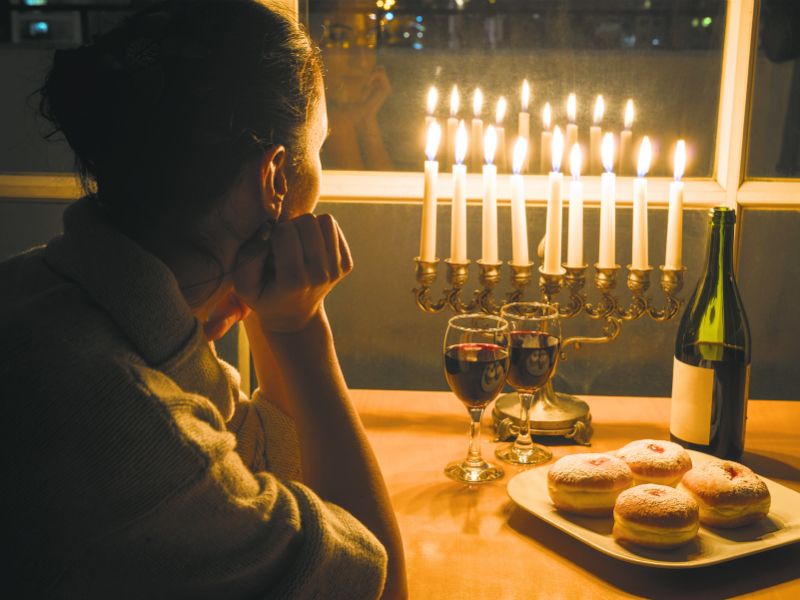When I see a great card in a stationary store, I buy multiple copies so that I can share the humour (the great cards are usually the funniest) with lots of people. One of my favourites (I still have a few tucked away) says “Happy Jewish Day” on the front and when you open it the message says “Really, who can keep track?” It’s funny because it’s true; there are a lot of Jewish holidays and, in the fall, it can be very hard to keep track.
But of all the holidays we mark and celebrate during the year, I find Hanukkah the hardest one to connect with beyond the surface rituals. My kids love it but I’m always a bit indifferent to their euphoria. The irony that the holiday that most emphasizes the importance of not assimilating falls at roughly the same time of year as the holiday with the greatest assimilationist push is a dynamic that colours how I, as a convert to Judaism, experience Hanukkah. When you’ve left the jingle bells and whistles of Christmas behind in favour of matzah and shofars, I think it’s inevitable that your experience of Hanukkah, in particular, is a bit complex.
READ: BRINGING A LITTLE PIECE OF ISRAEL TO SUDBURY, ONTARIO
We’re taught that once a person converts to Judaism, their status is no different than someone who was born Jewish. I’m Jewish, full-stop. The Jew-by-choice label isn’t supposed to matter. Hanukkah is one time of year when, even after 15 years, it does matter. I don’t think of Passover in relationship to Easter but I don’t know if I’ll ever be able to stop thinking of Hanukkah as the anti-Xmas.
The ubiquity of Christmas makes me cranky; the barrage of tinsel and Santa and carols and lights and parties and trees and advertising and that darn elf on his infernal shelf starts in early November and doesn’t let up until January. While I smile sweetly as the holly and the ivy encroach on my office cubicle, what I really want to do is hide for a couple of months. My friends who were born Jewish, on the other hand, are much more blasé about the whole thing. They go to friends’ Christmas parties, hum Frosty the Snowman and go dashing through the snow completely angst-free. It’s not their circus but they can still enjoy the monkeys.
Christmas-mania doesn’t irritate me because I miss celebrating the holiday. It’s actually quite freeing not to have to engage with all the consumerism. On the contrary, Christmas is like a bad ex-boyfriend who I keep running into every day in spite of my efforts to avoid him. I just want to buy my groceries; leave me alone, already! That’s what makes Hanukkah hard; I struggle to connect spiritually to it when I’m always experiencing it through the veil of my inability to escape Christmas.
I like to tell my children (particularly when they’re lamenting our lack of a swimming pool, or some other such trial of an over-privileged childhood) that we live in a safe neighbourhood, in a safe city, in one of the safest countries in the world. To live here is to have won the only lottery that really matters. Given this good fortune, is it fair to ask for another miracle? What chutzpah! If it isn’t too much to ask, however, what I’d really like this Hanukkah is to be able to find my own connection to the holiday, a connection that has nothing to do with that other holiday-that-shall-not-be-named. The miracle I’m hoping for is small, but mighty, kind of like the Maccabees, themselves. Maybe there’s hope for me yet.
